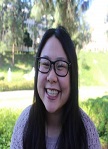Alumni Detail
| Detailed Information |  Vivian LUU (2016) Vivian LUU (2016)Education UCI, Asian American StudiesAppointment/Title: Program Coordinator, Parent and Family Campus Connections Biography/Additional Information I decided to major in Asian American Studies because it was an interdisciplinary program, so I got to learn about Asian American history, stories, and experiences in different lenses. Growing up, I remember filling out surveys and questionnaires in which I always identified myself as Asian American without much thought. Once I got to UCI, I started really asking myself what it meant to be Asian American. I was able to explore this identity and community through campus and community organizations as well as AAS classes. One of the most important things I learned through AAS courses is to ask questions! You don’t know what you don’t know, so asking questions helps you learn and engage within the classroom.My background in AAS allowed me to learn about and explore intersectionality in identities and experiences. This is especially important in my current work at Student Transition Services as a Program Coordinator for the Parent and Family Campus Connections program. The program was developed to support the parents and families of first- generation, low- income students and connect them to the university. When developing intentional programming and services for our families, I keep in mind the challenges families face in navigating the university such as limited family resources (time, transportation childcare) or communication barriers. Understanding the intersectionality’s of identities and experiences allows me to provide personalized and specific support to our families as they transition into or through the university. AAS was such an integral part of my time at UCI. I chose to volunteer for the AAS research internship because my experience with this history was very limited to what I had heard in my AAS classes. My professors briefly mentioned how students fought to have AAS at UCI and how there was a hunger strike in the 1990s. Being a part of this internship allows me to analyze and contextualize the history of AAS as a living process with many people involved instead of a single or defining moment. The founding of AAS at UCI happened on Ring Road, in front of buildings we pass by everyday, and in the spaces we study or work in. The thought of that really excites me! There’s so much history around us when we take the time to look around and listen. Looking through the archival collections, in general, has been very exciting! My favorite has to be reading through Rice Paper, which was a newspaper for Asian American and Pacific Islander students in the 1990s. Students, staff, and faculty contributed articles, artwork, and creative writing pieces relating to the AAPI community and what it means to be AAPI. It was neat to see that students created this space for themselves to explore their identities and cultures as well as have conversations that we are still having today! A lot of the classes in AAS are small and intimate. Not only do you get to know your professors well, but they get to know you as well. Have you ever felt intimidated to approach a professor or speak up in class? That was me when I first started at UCI. When I was taking my first upper- division course, I was surprised to find out that my professor knew my name even though we had very few and brief interactions. My professor knowing my name meant a lot, especially in a university setting where we meet countless people everyday. It gave me the courage to use my voice and share my ideas. Besides the class size, taking an AAS course is a challenging yet rewarding experience. You’ll question what you know, learn and unlearn constantly, and find connections in things you once thought were unrelated. |
|---|
